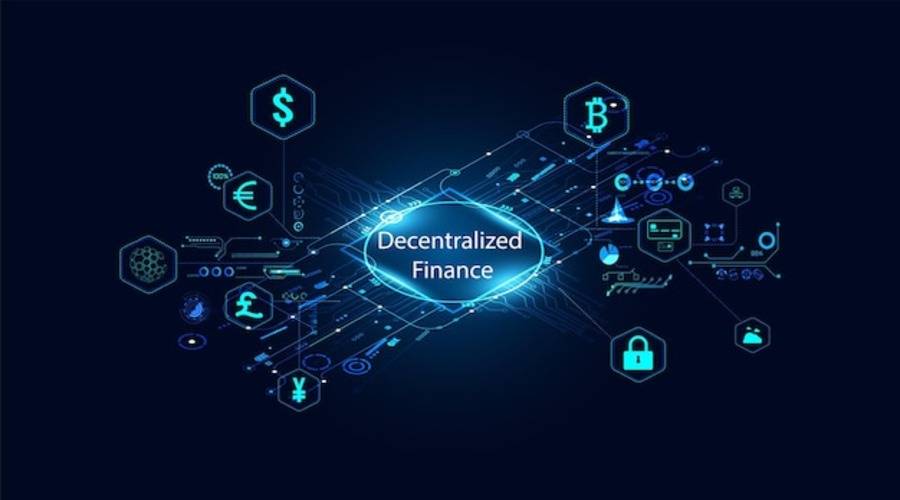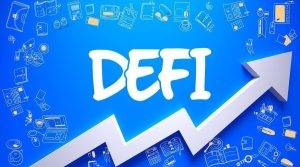Understanding the Risks in Decentralized Finance

Understanding the Risks in Decentralized Finance
Decentralized Finance, often referred to as DeFi, has emerged as a disruptive force in the financial industry. Built on blockchain technology, DeFi offers a decentralized alternative to traditional financial systems. It promises greater accessibility, transparency, and financial freedom. However, with its unique structure and innovative nature, DeFi also comes with inherent risks that users should be aware of. In this article, we will explore the risks associated with decentralized finance and discuss strategies to mitigate them.
What is Decentralized Finance (DeFi)?
Decentralized Finance, or DeFi, is a system of financial applications and protocols that operate on decentralized networks such as Ethereum. Unlike traditional finance, which relies on intermediaries such as banks and brokers, DeFi eliminates the need for intermediaries by utilizing smart contracts and decentralized platforms. It enables users to access a wide range of financial services, including lending, borrowing, trading, and asset management, directly from their digital wallets.
Decentralized Finance, commonly known as DeFi, is a revolutionary system that aims to transform the traditional financial landscape. It leverages blockchain technology and smart contracts to create an open and decentralized ecosystem for financial transactions and services. Unlike traditional finance, which relies on intermediaries like banks and financial institutions, DeFi operates on decentralized platforms, predominantly on the Ethereum blockchain.
DeFi enables users to access a wide range of financial services such as lending, borrowing, trading, and investing, all without the need for a middleman. It eliminates the barriers associated with traditional finance, offering greater accessibility, transparency, and inclusivity. Anyone with an internet connection and a digital wallet can participate in DeFi applications.
Smart contracts, the backbone of DeFi, are self-executing agreements written in code. They automatically execute predefined conditions and rules, ensuring transparency and eliminating the need for intermediaries. This not only streamlines processes but also reduces costs and allows for faster and more efficient transactions.
DeFi has gained significant attention and adoption due to its potential to revolutionize finance by democratizing access, enhancing financial control, and fostering innovation in the industry.
Benefits of Decentralized Finance
Before diving into the risks, let’s first understand the benefits that decentralized finance brings to the table. Some of the key advantages of DeFi include:
- Accessibility: DeFi allows anyone with an internet connection to participate in financial activities without the need for a bank account or approval from a centralized authority.
- Transparency: All transactions on DeFi platforms are recorded on the blockchain, making them transparent and publicly verifiable. This reduces the risk of fraud and manipulation.
- Automation and Efficiency: DeFi utilizes smart contracts, which are self-executing agreements with predefined rules. These smart contracts automate processes, eliminating the need for manual intervention and reducing costs.
- Global Reach: DeFi operates on a global scale, enabling seamless cross-border transactions and financial interactions without the limitations imposed by traditional financial systems.

Risks Associated with Decentralized Finance
While decentralized finance offers exciting opportunities, it is essential to be aware of the risks involved. Here are some of the key risks associated with DeFi:
Smart Contract Vulnerabilities
Smart contracts are the building blocks of DeFi applications. They are self-executing contracts with the terms of the agreement directly written into the code. However, smart contracts are not immune to vulnerabilities. Bugs or coding errors in smart contracts can lead to exploitations, resulting in financial losses for users. It is crucial to conduct thorough audits of smart contracts and rely on reputable auditors to minimize this risk.
Regulatory Uncertainty
Decentralized finance operates in a relatively unregulated space. While this provides freedom and flexibility, it also exposes users to regulatory uncertainty. Governments and regulatory bodies are still grappling with how to address DeFi, and there is a possibility of regulatory changes that could impact the landscape. Staying informed about evolving regulations and ensuring compliance is essential for mitigating this risk.
Lack of Centralized Oversight
Unlike traditional financial systems that have centralized authorities overseeing transactions and resolving disputes, DeFi operates in a decentralized manner. While decentralization brings benefits, it also means there is no central authority to turn to in case of issues or fraudulent activities. Users need to rely on the community and decentralized mechanisms to address disputes, which can be challenging.
Market Volatility
The cryptocurrency market, which forms the backbone of many DeFi applications, is known for its volatility. Prices of cryptocurrencies can fluctuate dramatically, impacting the value of assets held within DeFi platforms. Users should be prepared for market volatility and consider diversifying their investments to mitigate potential losses.
User Error and Security Breaches
DeFi platforms require users to manage their private keys and interact with smart contracts directly. This introduces the risk of user error, such as sending funds to the wrong address or falling victim to phishing attacks. Additionally, DeFi platforms can become targets for hackers, who may exploit vulnerabilities in the system to steal funds. Implementing robust security measures, such as using hardware wallets and practicing good cybersecurity hygiene, is crucial to protect against these risks.
Mitigating Risks in Decentralized Finance
While risks exist in decentralized finance, there are steps that users can take to mitigate them effectively. Here are some strategies to consider:
Auditing Smart Contracts
Before using a DeFi platform, conduct thorough audits of the smart contracts that underpin the platform. Look for reputable auditors and check for any past vulnerabilities or security incidents. This will help identify potential risks and ensure the smart contracts are secure. Auditing smart contracts is a crucial process in the world of decentralized finance (DeFi). It involves thoroughly reviewing and assessing the code and functionality of smart contracts to identify any vulnerabilities, bugs, or potential risks. This helps ensure the security and reliability of the smart contracts used in DeFi applications.
Regulatory Compliance and Education
Stay informed about regulatory developments in the DeFi space and ensure compliance with any applicable regulations. Educate yourself about the legal and regulatory landscape to navigate it effectively and avoid potential legal consequences. Regulatory compliance and education are essential aspects of navigating the decentralized finance (DeFi) space. Staying informed about evolving regulations and understanding the legal landscape surrounding DeFi is crucial for users and platforms to operate within the boundaries of applicable laws and regulations, ensuring a compliant and sustainable ecosystem.
Due Diligence and Research
Before investing or participating in any DeFi project, conduct extensive due diligence. Research the team behind the project, evaluate the project’s fundamentals, and assess its community reputation. Look for red flags or warning signs that could indicate potential risks. Performing due diligence and conducting thorough research are vital steps when engaging with decentralized finance (DeFi) projects. It involves evaluating the project’s team, fundamentals, community reputation, and potential risks. By conducting due diligence, users can make informed decisions and mitigate potential risks associated with DeFi investments and participation.
Diversification of Investments
Diversifying your investments across different DeFi platforms and asset classes can help reduce risk. Avoid putting all your funds into a single platform or asset, as this leaves you vulnerable to specific platform or market risks. Diversification of investments is a prudent strategy in decentralized finance (DeFi). By spreading investments across different platforms, projects, and asset classes, users can reduce the risk of loss due to platform-specific or market-specific factors. Diversification allows for a more balanced portfolio and helps mitigate the impact of potential failures or market volatility in a single investment.
Strong Security Measures
Implement strong security measures to protect your assets. Use hardware wallets for storing cryptocurrencies, enable two-factor authentication (2FA) whenever possible, and be cautious of phishing attempts and suspicious links or emails. Implementing strong security measures is crucial when participating in decentralized finance (DeFi). Measures such as using hardware wallets, enabling two-factor authentication (2FA), and practicing good cybersecurity hygiene help protect users’ digital assets and personal information. By prioritizing security, users can reduce the risk of theft, fraud, and unauthorized access to their DeFi accounts and funds.
Conclusion
Decentralized finance offers tremendous potential for financial inclusivity and innovation. However, it is essential to understand and manage the risks associated with this emerging sector. By being proactive and adopting appropriate risk mitigation strategies, users can navigate the world of DeFi with confidence.
FAQs (Frequently Asked Questions)
FAQ 1: What are the potential benefits of decentralized finance?
Decentralized finance offers benefits such as accessibility, transparency, automation, and global reach. It enables individuals to access financial services directly, without intermediaries, and promotes financial inclusion.
FAQ 2: How can I protect my investments in decentralized finance?
To protect your investments in decentralized finance, you should conduct due diligence, diversify your investments, implement strong security measures, and stay informed about regulatory developments.
FAQ 3: Are decentralized finance platforms regulated?
Decentralized finance platforms operate in a relatively unregulated space. However, regulatory developments are ongoing, and compliance with applicable regulations is crucial to ensure legal compliance.
FAQ 4: What are the common security measures in decentralized finance?
Common security measures in decentralized finance include using hardware wallets, enabling two-factor authentication (2FA), and being cautious of phishing attempts and suspicious links or emails.
FAQ 5: Is decentralized finance suitable for beginners?
Decentralized finance can be complex, and beginners should take the time to educate themselves about the fundamentals and associated risks. It is advisable to start with small investments and gradually increase involvement as understanding grows.

I’m known as one of the best crypto authors because I take time to understand the technology and write in a way that is easy for others to understand. I can simplify complex concepts and my writing style is engaging. My articles have been featured on some of the top crypto sites and I’mregularly sought out by readers for my insights on the latest news. I’m also a speaker and have discussed crypto at various conferences. If you’re looking for someone who can help you make sense of the ever-changing world of cryptocurrency, then you can get in touch with me.



